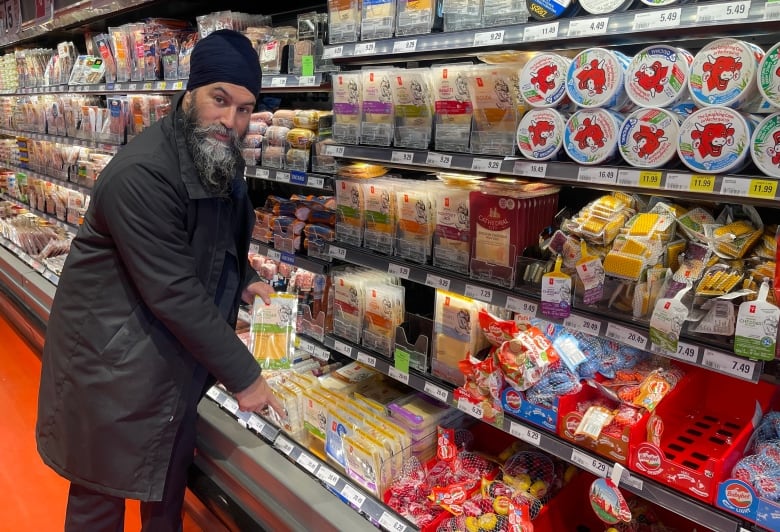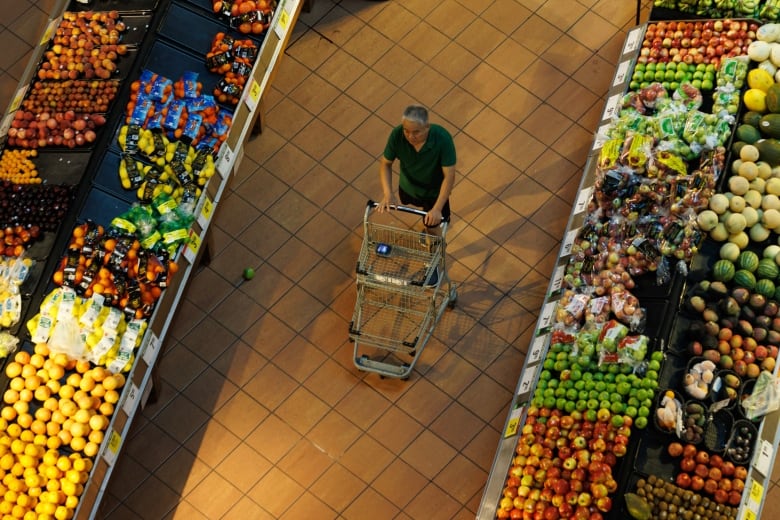It may very well have started with a tweet about $37 chicken breasts. Or it could have been the $10 birch sticks.
The $9 butter didn’t help, or $30 for Feta cheese — allegedly twice the price for the same brand carried by a competitor.
Whatever may have been the social media tipping point, a lot of people are angry about high prices in grocery stores, Loblaw brands in particular. Throw in shrinkflation, skimpflation and greedflation, and now a growing group of people online are calling for a boycott.
“I think a lot of people have very little faith in our political leaders to actually hold corporations accountable for the positions they are putting Canadians in,” said Emily Johnson, a mental health and addictions worker in Milton, Ont., who runs a quickly growing Reddit community called “Loblaws is out of control.”
“People feel voting with their dollar is the best way of showing companies that they’ve had enough,” Johnson told CBC News.
“Hey, are you ready to take down Galen Weston Jr….” 👇👇👇👏<a href=”https://twitter.com/hashtag/boycottloblaws?src=hash&ref_src=twsrc%5Etfw”>#boycottloblaws</a> <a href=”https://twitter.com/hashtag/boycottshoppersdrugmart?src=hash&ref_src=twsrc%5Etfw”>#boycottshoppersdrugmart</a> <a href=”https://twitter.com/hashtag/loblaws?src=hash&ref_src=twsrc%5Etfw”>#loblaws</a> <a href=”https://twitter.com/hashtag/loblawsboycott?src=hash&ref_src=twsrc%5Etfw”>#loblawsboycott</a> <a href=”https://twitter.com/hashtag/easter?src=hash&ref_src=twsrc%5Etfw”>#easter</a> <a href=”https://twitter.com/hashtag/easter2024?src=hash&ref_src=twsrc%5Etfw”>#easter2024</a> <a href=”https://twitter.com/hashtag/corporategreed?src=hash&ref_src=twsrc%5Etfw”>#corporategreed</a> <a href=”https://t.co/22WjSfRLtb”>pic.twitter.com/22WjSfRLtb</a>
—@Garnet_2203
In a post last month, she and the other subreddit moderators encouraged its now-45,000 members to start boycotting Loblaw and Loblaw-owned stores, such as Superstore and No Frills, in May. The movement that has gained traction on other social media platforms like X, formerly Twitter, and TikTok.
“Canadians are facing a cost-of-living crisis, and grocers are a major contributor to this. Vulnerable populations such as seniors, persons with disabilities, and those on fixed incomes are left further behind,” the post reads.
The goal is for the company to reduce prices by 15 per cent and remove member-only pricing, Johnson said. But some grocery and economics experts say a boycott of a brand as massive as Loblaw is unlikely to have much, if any, impact.
Loblaw is sensitive to bad press like any corporation, said Nicholas Li, an assistant professor in the department of economics at Toronto Metropolitan University. But he’s skeptical about the planned boycott, he added.
“Loblaws showed earlier in its fight with Pepsico/Frito-Lay that it is willing to leave shelves empty in a fight over money with suppliers, so I find it highly unlikely that a boycott like this … would make them change their mind,” he said.
Sylvain Charlebois, Director of Agri-Food Analytics Lab at Dalhousie University, says costs for the big grocery chains have legitimately gone up, but the industry as a whole is taking a lot of heat from consumers for higher food prices right now.
#BoycottLoblaws
The planned boycott points to how frustrated many consumers are about food prices, which have gone up everywhere, not just at Loblaw-owned stores, said Sylvain Charlebois, senior director of the Agri-Food Analytics Lab at Dalhousie University in Halifax.
In a subsequent post, the Reddit group acknowledges the problem extends to “The Big Five” — Loblaw, Sobeys, Metro, Walmart and Costco — and posts a list of alternative shopping options for them, too.
Loblaw is heavily targeted for two reasons, Charlebois said. First, because it’s the top grocer in the country. Second, because its chairman and former president, Galen Weston, was a very visible face of the company — and now people see him a villain.
“I suspect that most Canadians don’t know who the CEO of Metro is,” Charlebois said. “He’s paying for that PR strategy.”
That’s evident in the “boycott Loblaws” hashtag making the rounds on social media, and in the subreddit, where Weston’s image is often used in memes and his name is often cited when people are angry or confused about Loblaw prices.
“Are you ready to take down Galen Weston Jr. and Loblaws? I am,” one person associated with the Reddit group said in a TikTok video posted March 25.
“Can someone explain the Galen Weston math on this one?” a TikToker said in a video posted in December about the price of carrots.
Michael Mulvey, an associate professor of marketing at the University of Ottawa who teaches consumer behaviour, says it will be difficult for Loblaw to ignore this “down with the overlord” type of discourse happening on social media right now.
“Loblaws is certainly listening. Whether they abide by it is another question, but they cannot ignore when they are headline news,” Mulvey said.
In an email statement to CBC News, a Loblaw spokesperson said that customers also say on Reddit that “they’re getting real value at our stores, often the best across the industry.”
“As a business, we are acutely aware of the fact that we have to win our customers’ business each and every day. The last few years have been tough for Canadians, and we continue to do what we can to combat inflation at our stores,” the company said.

Company difficult to avoid for some
One potential issue with the boycott is the sheer scope of it, some have pointed out. The Reddit group’s post explains the boycott is for all Loblaws and Loblaw-owned stores, and its subsidiaries.
Loblaw is a massive company, extending into groceries — where it has nearly a third of national sales — as well as pharmacy, health and beauty, apparel, general merchandise, financial services and wireless mobile products and services.
In terms of grocery stores, there’s Atlantic Superstore, Dominion, Loblaws, Maxi, No Frills, Provigo Le Marché, Valu-Mart, Real Canadian Superstore, Wholesale Club, Your Independent Grocer, T&T and Zehrs.
But on top of that, Loblaw also owns major names like Shopper’s Drug Mart, Pharmaprix, Wellwise by Shoppers, Joe Fresh, Beauty BOUTIQUE and Quo Beauty, financial products like PC Financial and wireless provider PC mobile.
According to their website, they have more than 2,400 stores across Canada. And they’re not slowing down. In February, the retailer announced it plans to build 40 more.
This ubiquitousness could make a boycott difficult for consumers who are unable to shop around, such as people without cars, the elderly, people with disabilities, and people in rural areas, Mulvey said.
“We do have individuals who are basically captive consumers,” he said.
Johnson, the Reddit moderator, says she recognizes that Loblaw’s market share leaves some people without many other shopping options. For them, the group has posted a list of other ways people can get involved, including writing a letter to their MP and donating time or money to food banks.
‘People need to eat’
Johnson started the subreddit Nov. 3, 2023, the same day someone on Reddit posted a photo of $85 Christmas planters they said they saw at Loblaws in Ontario. What started with a few thousand members mostly posting memes exploded in January when Loblaw announced it was getting rid of its half-price discount on food nearing its expiration date.
“It kind of started to take a shift from having fun and then talking about ‘this is a serious problem,”” Johnson said.
Loblaw quickly reversed the decision, but the Reddit group continued to grow. Today it has more than 45,000 members.
Just because the company reversed its 50 per cent discount decision doesn’t mean we should expect a similar response to the boycott, Li said. Changing back a discount probably didn’t have much impact on their bottom line, he said, and because it was a recent change they wouldn’t lose face.
“But cutting prices by 15 per cent and removing … special access to discounts for optimum card holders are anathema to Loblaw’s basic business model,” Li said.

Charlebois also says he thinks the boycott won’t affect the company. “People need to eat,” he said.
Whether or not the company feels any kind of pinch or people actually boycott the stores, Mulvey says the movement could give some consumers a moment of pause and question their grocery bills.
“When you start hearing a chorus or an orchestra of people all tuned in on price sensitivity, it makes it more salient.”




